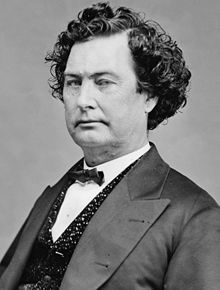Richard Yates (19th century politician)
| Richard Yates | |
|---|---|
 |
|
|
United States Senator from Illinois |
|
|
In office March 4, 1865 – March 3, 1871 |
|
| Preceded by | William A. Richardson |
| Succeeded by | John A. Logan |
| 13th Governor of Illinois | |
|
In office January 14, 1861 – January 16, 1865 |
|
| Lieutenant | Francis Hoffmann |
| Preceded by | John Wood |
| Succeeded by | Richard J. Oglesby |
| Member of the U.S. House of Representatives from Illinois's 6th district |
|
|
In office March 4, 1853 – March 3, 1855 |
|
| Preceded by | Thompson Campbell |
| Succeeded by | Thomas L. Harris |
| Member of the U.S. House of Representatives from Illinois's 7th district |
|
|
In office March 4, 1851 – March 3, 1853 |
|
| Preceded by | Thomas L. Harris |
| Succeeded by | James C. Allen |
| Member of the Illinois House of Representatives | |
|
In office 1842–1845 1848–1849 |
|
| Personal details | |
| Born | January 18, 1815 Warsaw, Kentucky |
| Died | November 27, 1873 (aged 58) St. Louis, Missouri |
| Political party | Republican |
| Alma mater |
Illinois College Transylvania University |
| Profession | Politician |
| Signature | |
Richard Yates (January 18, 1815 – November 27, 1873) was the Governor of Illinois during the American Civil War and has been considered one of the most effective war governors. He also represented Illinois in the United States House of Representatives, 1851–1855 and as a U.S. Senator, 1865–1871.
Yates was born in Warsaw, Kentucky and moved with his family to Illinois in 1831. He studied at Miami University and Georgetown College and graduated from Illinois College in Jacksonville, Illinois, in 1835. He then studied law at Transylvania University in Lexington, Kentucky. He was admitted to the bar in 1837 and commenced practice in Jacksonville.
Yates served as a member of the Illinois House of Representatives from 1842 to 1845 and 1848 to 1849. In 1850, he was elected as a Whig to the United States House of Representatives where he was the youngest member of the Thirty-second Congress. He was reelected to Congress in 1852. During Yates' second term in Congress, the repeal of the Missouri Compromise reopened the anti-slavery question. He opposed the repeal, and became identified with the new Republican Party. His district was pro-slavery and consequently he narrowly lost his bid for a third term.
In 1860 he was elected governor as a Republican. Governor Yates continued to be an outspoken opponent of slavery, and at the opening of the Civil War was very active in raising volunteers. He convened the legislature in extra session on April 12, 1861, the day after the attack on Fort Sumter, and took military possession of Cairo, garrisoning it with regular troops. In Governor Yates's office General Ulysses S. Grant received his first distinct recognition as a soldier in the Civil War, being appointed by Yates mustering officer for the state, and afterward colonel of the 21st Illinois regiment. In 1862, he attended the Loyal War Governors' Conference in Altoona, Pennsylvania, which ultimately gave Abraham Lincoln support for his Emancipation Proclamation.
...
Wikipedia
